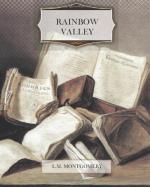“I wish we were a blacksmith’s children,” protested Faith angrily, hunting for her stockings. “Then people wouldn’t expect us to be better than other children. Just look at the holes in my heels. Mary darned them all up before she went away, but they’re as bad as ever now. Una, get up. I can’t get the breakfast alone. Oh, dear. I wish father and Jerry were home. You wouldn’t think we’d miss father much—we don’t see much of him when he is home. And yet everything seems gone. I must run in and see how Aunt Martha is.”
“Is she any better?” asked Una, when Faith returned.
“No, she isn’t. She’s groaning with the misery still. Maybe we ought to tell Dr. Blythe. But she says not—she never had a doctor in her life and she isn’t going to begin now. She says doctors just live by poisoning people. Do you suppose they do?”
“No, of course not,” said Una indignantly. “I’m sure Dr. Blythe wouldn’t poison anybody.”
“Well, we’ll have to rub Aunt Martha’s back again after breakfast. We’d better not make the flannels as hot as we did yesterday.”
Faith giggled over the remembrance. They had nearly scalded the skin off poor Aunt Martha’s back. Una sighed. Mary Vance would have known just what the precise temperature of flannels for a misery back should be. Mary knew everything. They knew nothing. And how could they learn, save by bitter experience for which, in this instance, unfortunate Aunt Martha had paid?
The preceding Monday Mr. Meredith had left for Nova Scotia to spend his short vacation, taking Jerry with him. On Wednesday Aunt Martha was suddenly seized with a recurring and mysterious ailment which she always called “the misery,” and which was tolerably certain to attack her at the most inconvenient times. She could not rise from her bed, any movement causing agony. A doctor she flatly refused to have. Faith and Una cooked the meals and waited on her. The less said about the meals the better—yet they were not much worse than Aunt Martha’s had been. There were many women in the village who would have been glad to come and help, but Aunt Martha refused to let her plight be known.
“You must worry on till I kin git around,” she groaned. “Thank goodness, John isn’t here. There’s a plenty o’ cold biled meat and bread and you kin try your hand at making porridge.”
The girls had tried their hand, but so far without much success. The first day it had been too thin. The next day so thick that you could cut it in slices. And both days it had been burned.
“I hate porridge,” said Faith viciously. “When I have a house of my own I’m never going to have a single bit of porridge in it.”
“What’ll your children do then?” asked Una. “Children have to have porridge or they won’t grow. Everybody says so.”
“They’ll have to get along without it or stay runts,” retorted Faith stubbornly. “Here, Una, you stir it while I set the table. If I leave it for a minute the horrid stuff will burn. It’s half past nine. We’ll be late for Sunday School.”




